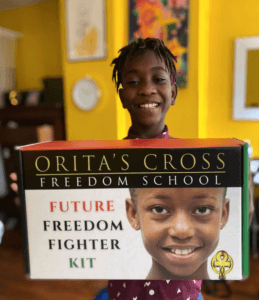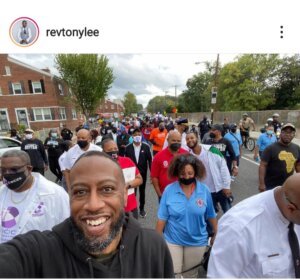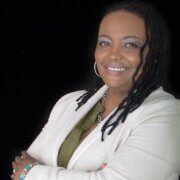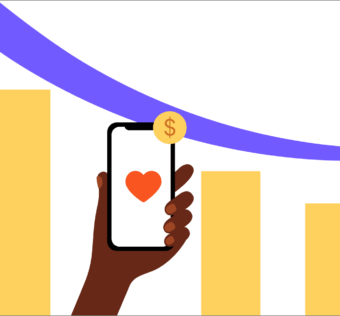The Importance of Social Justice & the Black Church
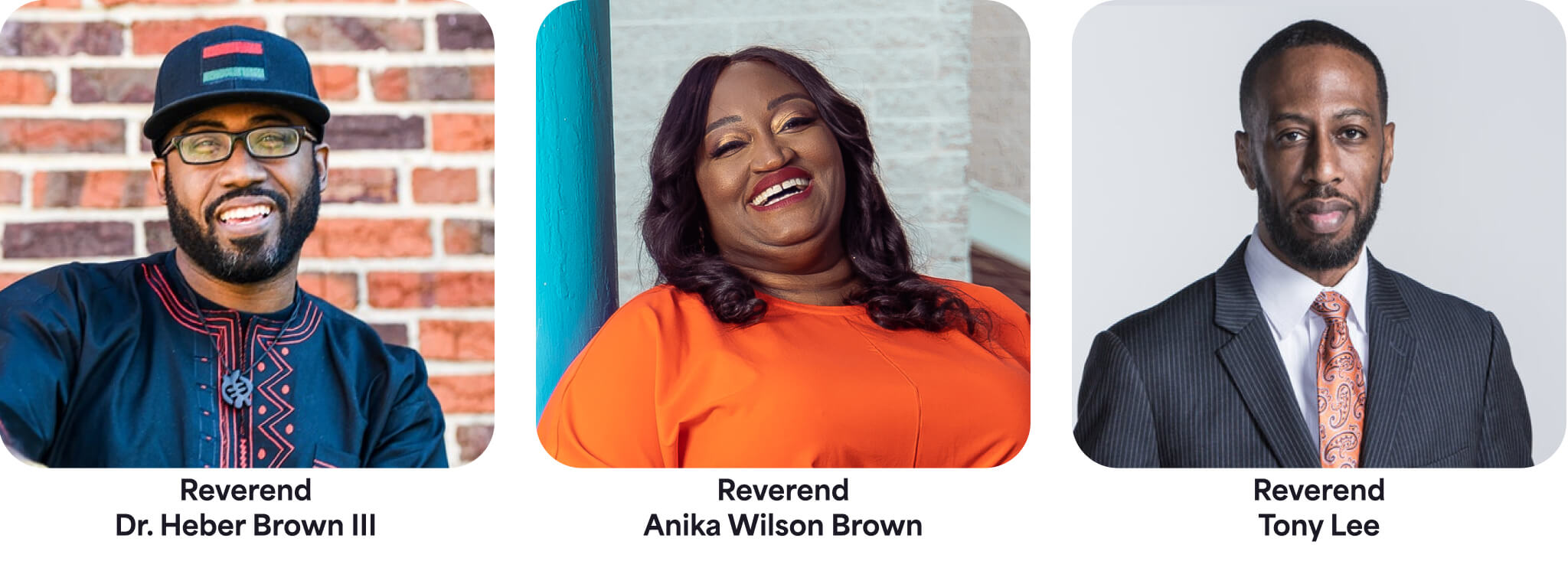
Read more about how Rev. Dr. Heber Brown III, Rev. Anika Wilson Brown, and Rev. Tony Lee are guiding their congregations and communities in activism to gain personal growth and collective power. They also speak to the importance of giving generously to the church to support its work in the community.
__________________________________________
Rev. Dr. Heber Brown III, Pleasant Hope Baptist Church, Baltimore, Maryland
Dr. Brown, a community organizer and social entrepreneur, broke some news during his interview with Givelify. He will be stepping down as Pastor of Pleasant Hope Baptist Church in May to fully focus on Black farmers and food justice. “If we are ever to free ourselves, we must learn how to feed ourselves,” he said. “We will never get a handle on our health until we have power over our plates.”
Given his church’s emphasis on Black liberation and social justice, it makes sense that Dr. Brown, the older brother of gospel music artist Anthony Brown, is transitioning into full-time social justice work. He says, “We are a very unconventional church. We are passionate about community organizing and personal growth toward collective power.”
<< Register for free March 9 webinar: Maximize Easter generosity: Turn one-time givers into year-long supporters >>
How has your church celebrated Black History Month?
For Pleasant Hope Baptist Church, it’s Black History Month all the time! We have Adinkra symbols from Ghana, West Africa, all around our church building. There’s also an ancestor altar that sits in our sanctuary. We embrace our ancestors and celebrate them in our faith practice.
But in February, in particular, we celebrate Black History Month each Sunday, as well. We’ve had an HBCU-themed Fraternity and Sorority Sunday. Think of homecoming or a pep rally and that’s what we have on Sunday morning. We also invite speakers to discuss community outreach and other topics.
We wear our cultural attire to celebrate our heritage. We’ve also hosted a “Difference Maker” series where every Sunday we highlighted what people are doing in our communities today to make Black history. We’ve had university presidents, journalists, and elected officials as part of that series.
Why is social justice important to the Black church?
I take my cues from Jesus. He was concerned with those who were hungry and marginalized in society. Jesus didn’t just talk about the things that needed to be done. He rolled up His sleeves and organized other people to help Him. I’m also inspired by Luke 4:18-20 where Jesus talks about the poor, the prisoners, the brokenhearted, and the captives.
Black churches must show up to share the same concerns as Jesus. They must explore, experiment, and innovate on Jesus’ ministry – beyond Sunday mornings and outside the four walls of the church. They must do this in our communities as neighbors caring about people holistically.
As a pastor, how do you engage with social justice issues?
At Pleasant Hope, we organize safe spaces for Black children to learn about Black history, culture, and heritage. I founded in 2010 the Orita’s Cross Freedom School. It is an African-centered youth educational program based at the church that teaches Africana history and skills like gardening, mechanics, and culinary essentials. The school meets on days that public schools are closed, such as holidays and personal development days for teachers.
The other way is the Black Church Food Security Network, which connects Black churches to Black farmers to create our own supply chains from the soil to the sanctuary. The Black church can be the space to advance economic justice for Black farmers even as they advance health equity for us.
The Network was founded in 2015 during the uprising in Baltimore after the death of Freddie Gray. I realized those communities nearest the epicenter of the demonstrations already had food insecurity challenges, and they got even worse during the uprising. That presented a vacuum, and the church leaned in because the church is always going to be there for the community.
Tell us about your transition from pastoring to full-time social justice work.
The Black Church Food Security Network continues to grow every week. It is national and encompasses more than 70 congregations and an equal number of Black farmers. We are as far west as Omaha, Nebraska, as far south as Jacksonville, Florida, and as far north as Harlem, New York.
I announced to my church in January that after pastoring them for 13 years, I will leave the church completely in May 2022 and devote myself full-time to the Network.
What role does giving play in your church’s community activism?
To embrace all that God has put before us, we need every member of Pleasant Hope to be a tither. And anyone who is not a member, but is a supporter, we would like for them to consider being a consistent giver to this ministry.
We request that giving be consistent, regular, and automatic because what God has for us is also consistent, regular, and automatic. We want to get everything God has for us to make a difference in our individual lives, and in the community as well. Partnering with our members and supporters, I’m sure we can get it done.
__________________________________________
Rev. Anika Wilson Brown, Union Temple Baptist Church, Washington, D.C.
Rev. Wilson Brown is a sought-after speaker on the topic of merging faith and psychotherapy. She says the process towards true healing is, in fact, a spiritual one that requires follow-up care with therapeutic techniques for ultimate wholeness.
She served as Assistant Pastor at Union Temple for seven years before she succeeded her father as Lead Pastor in 2020. Social justice is part of the DNA of the church, she shared. “My father is Mr. Social Justice in Washington, D.C.,” said Rev. Wilson Brown, MSW, Ph.D. “As my father’s daughter, there was a lot of pressure on me at first to participate in social activism in a certain way.”
Her father, Rev. Willie F. Wilson, led Union Temple for 31 years, where he nurtured a Christocentric and Afrocentric ministry. “I’m out in the streets sometimes. And at other times, I’m offering mental and spiritual support for those who have been wounded out in the streets,” Rev. Wilson Brown said. “I have my own unique way of responding to the call for social justice.”
Why is social justice important to the Black church?
It’s a big part of our church. For example, our church is in a food desert. Although gentrification is changing the climate around us, we now have a Starbucks, but no good grocery store. One has to go outside of the community to find good, healthy food.
We started a garden ministry at the church about five years ago. When we have a harvest of collard greens or such, we give those away for free in the community. We had grant funding initially, but now it’s solely church-funded. I’m looking to partner with Dr. Heber Brown III soon to make the garden sustainable.
Also, we are very connected to our neighborhood schools. We provide both manhood and womanhood training programs that feature an Afrocentric rite of passage process. We help prepare the students for adulthood and what it means to live a spiritual and prosperous life. Near the end of each two-year program, we take them to Ghana for their rites of passage crossover.
And then there’s the outreach advocacy that we do. We have some church members who are marchers. They are out there with their signs. Meanwhile, others don’t want to protest in the streets, but they will prepare a warm meal for the marchers. I tell my congregation to find their own lane and not feel pressured to move beyond their personal, unique calling to social justice.
What will be the biggest social justice issues for 2022?
One of the key issues will be police reform. We continue to have these horrible instances of police acting in an aggressive and violent nature when it comes to Black people they are encountering in the community. We have to deal with the underlying feelings and thoughts of the police. That is what often results in police being trigger-happy and treating Black people very differently than others.
We also have a problem with police training. Police are often brought into situations that they are not really equipped to manage. They are often called in to deal with mental health issues or issues in the school, and then, of course, those situations are then treated like criminal interaction.
Also, coming out of this pandemic, it has been made blatantly clear the health disparities that exist in the Black community as far as access to healthcare. We have to look at all of the underlying conditions that made us more susceptible to contracting and dying from COVID-19. Healthcare hasn’t been equal.
Will President Biden nominate a Black woman to the Supreme Court?
I always try to maintain a posture of faith and prayer. But I also know the system we’re living in. I do believe he will push a nomination of a Black woman forward. But it’s important to me that it’s a progressive Black woman. She should be committed to civil rights and equality. You can find a Black woman who is highly educated. But will she actually advocate for us? That’s the biggest concern I have.
(Author’s note: A day after this article was originally published, President Biden selected Judge Ketanji Brown Jackson as his nominee to the Supreme Court.)
How does giving factor into your success with social justice?
Giving is key. If this is going to be communal work, we all have to collectively come together to participate in the future we’re trying to create and build together. We all have to sow and give consistently.
We have to be more intentional and committed to giving and sowing into the places that feed us – like the church. The church is the bedrock of our communities. The church will be there praying for you, giving you resources, and supporting you. If the church is not there and is not able to sustain itself, what other place is going to be there for us?
At Union Temple, we recently launched the Rise Up Campaign. Our church is located in Southeast DC, where everything around us is rapidly changing. There is gentrification, but also a lot of displacement. Our church has received many offers to move out of our building, but we have made a commitment to stay. This capital campaign will help us sustain ourselves in the community.
Union Temple and our members have been called to Washington, D.C. We were founded in this community. Somebody has to stay to tell our stories.
__________________________________________
Rev. Tony Lee, Community of Hope AME Church, Hillcrest Heights, Maryland
Rev. Lee is the Senior Pastor of Community of Hope AME, which he founded 16 years ago. The church started in a nightclub and then worshipped in a mall for 14 years. Just before COVID-19 caused many churches to move from in-person services to virtual, the church relocated its worship services to a local skating rink.
The church is known throughout the region for its innovative ministry, social engagement, and community outreach – as is Rev. Lee, who is also a radio host for “Sunday Morning Hope” on WPGC 95.5 FM in the Washington, D.C.-area.
In July 2021, U.S. Capitol Police arrested Rev. Lee along with Congressional Black Caucus Chairwoman Rep. Joyce Beatty. They and others were walking through a U.S. Senate office building asking Senators to pass the John R. Lewis Voting Rights Advancement Act. It wasn’t his first or only time being arrested for his activism.
Rev. Lee serves as a Board Member of the National Coalition on Black Civic Participation, a member of the Board of Visitors for the Howard University School Of Divinity, a member of the Black Church & HIV Advisory Committee for the NAACP, and is a founding board member for the Black Church PAC.
How has your church celebrated Black History Month?
Black History Month is about continuity for us. I believe it should be a month of service, but it should connect to the service you’re already doing. Also, for the last 15 years or so, we’ve sponsored the Distinction of Hope Awards, which we give out to public figures we feel are making Black history right now. We want people to see how what we do now connects to the legacy of what we’ve done in the past.
What does social justice mean to your church?
I think it’s important for us to frame what social justice means for us as a church. Our church is called Community of Hope. Hope is an essential ingredient in faith. But we are surrounded by situations and environments filled with hopelessness. It’s hard to be faithful when you’re not even hopeful.
I believe it’s the church’s role to make an impact on the systems that are helping to keep our people from living life and living it more abundantly. At Community of Hope, we are engaged in a number of efforts at the local and national levels. We have also assisted with shaping policy.
The church has gained national recognition for our work around HIV/AIDS, violence prevention, community and police partnerships, and educational advocacy. For example, we’ve provided quarterly HIV/AIDS testing at our church for 15 years.
How do you reconcile pastoring with social justice work?
My question is: How can a pastor not do the full gospel and the full work of ministry?
It is spiritual malpractice as a pastor to just deal with people’s personal spirituality. My job as a pastor is to help people live as better Christians. They can live as better Christians when there are no shootings in their community, and they have access to healthy food, and good healthcare.
I can’t minister to them and then send them back to communities with no resources, no services, and no jobs. That sort of neglect of Black communities is systemic. How can I tell them to just go home and pray?
What are some of the relevant social justice issues in 2022?
One is environmental justice. It’s just not about forests and parks and saving the whales. People in urban communities are dealing with lead paint and old gas stations sitting in the middle of the community with chemicals seeping into the ground.
The digital divide is also a big deal. All you hear about is the next wave is the metaverse. But Black communities are having problems accessing the internet. Not all households have Wi-Fi.
Further, social justice isn’t just Black issues, but gender issues, as well — such as the difference in pay for women and men. Voting rights are not just Black issues, but it’s an issue of democracy. Health inequity is not solely about race, but also about class.
How has the digital divide affected the Black Church?
Online and mobile giving platforms, such as Givelify, have helped position churches for the pandemic. Churches that had been hesitant at first then started to move toward online giving.
People are paying for everything else online. Who uses checks now or even cash? The thing I love about Givelify is that it’s an equalizer. You don’t have to be a megachurch to use it. It used to be only the megachurches with million-dollar budgets that had fancy technology. Givelify allows everyone to access this technology.
Technology has allowed churches to spread the gospel beyond our geographic area. It has also allowed people from all over the world to give to churches, including my church. Praise the Lord that we don’t have to drop our tithes and offerings in an offering bucket. Now, you can give at any time.
I’ve watched how our giving has shifted – even as far as when we receive offerings. It’ll be 2 a.m. on a Thursday, and people are giving. Mobile giving apps like Givelify have helped people be good stewards.
*Interviews were edited for length.
